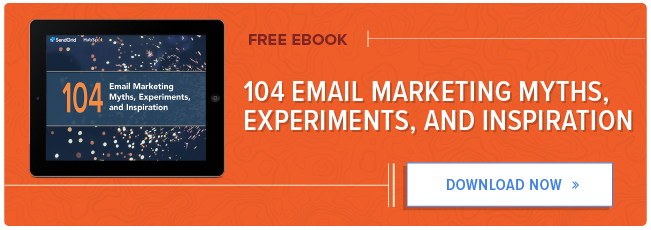We all know how flooded the average email inbox is today. And, while email marketing remains one of the most effective tools in the marketing toolbox, millions of emails go by unnoticed, unopened, and unread every day.
So, how can you avoid such a sad fate for your emails? And, what can you do to increase email engagement and get those coveted clicks on your CTA buttons?
Read on for ten actions that will increase your email engagement and save your emails from ending up in the trash folder.
10 Ways to Improve Email Engagement
1. Always send a welcome email.
The first email you send to a customer is usually a welcome email. The average open rate for a welcome email is 50%, which makes it much more effective than regular newsletters.
If we bear in mind that 76% of people expect a welcome email immediately after subscribing to your list, it’s clear that this email is an important one, so be sure to make the most of it.
Really Good Emails shares a great collection of welcome emails (and every other category you can think of) to inspire your strategy, including this excellent example from Postable. It delivers the discount code subscribers are waiting for, includes a beautiful graphic, and keeps things super simple.
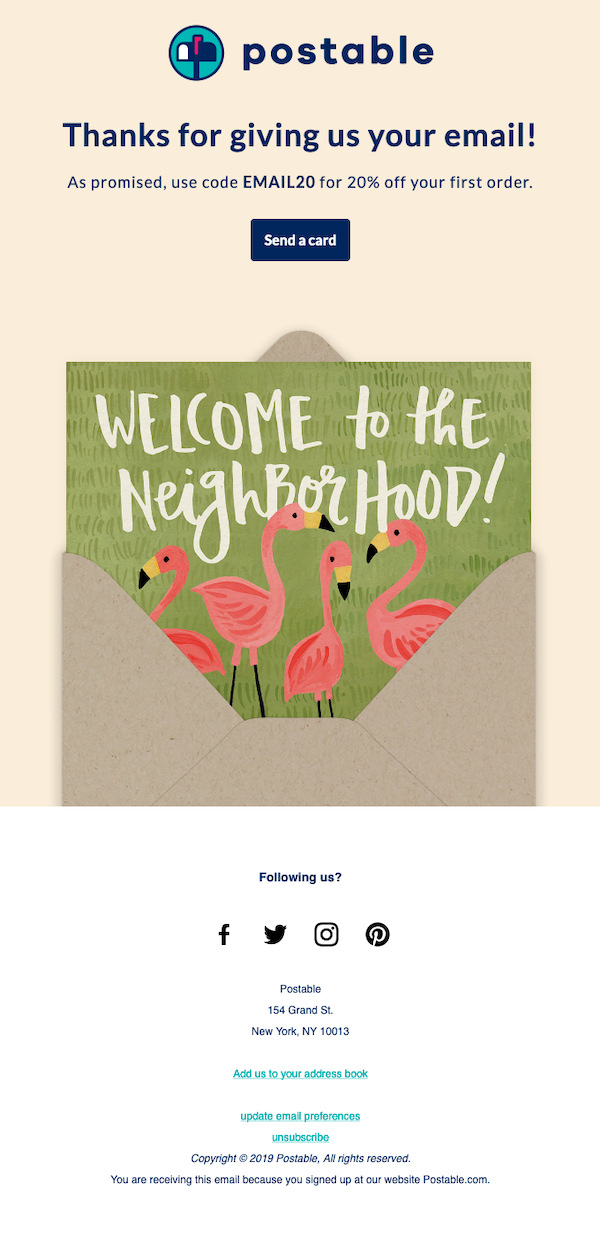
2. Optimize your subject lines.
47% of email recipients open emails based on the subject line alone. So yes, getting the subject line right is crucial.
But what makes a good subject line?
The best way to succeed is to leverage natural human tendencies such as:
- Curiosity
- FOMO (Fear Of Missing Out)
- Humor
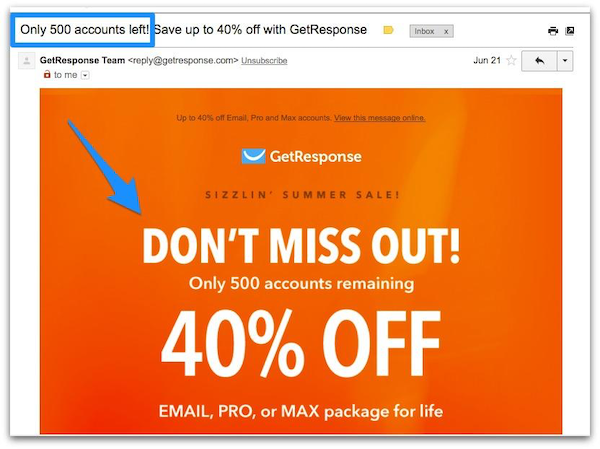
This is a typical FOMO subject line, where GetResponse is making it clear to its audience that they risk missing out on a whopping 40% off.
3. Don’t neglect the preheader text.
The preheader text, or preview text, is the snippet of text that follows the email subject line when a reader views your email in the inbox. It’s shown beside the subject line and sender name.
These examples from beauty marketplace, Cult Beauty, offer a preview of the brands and discounts it offers to encourage clicks:

This snippet is valuable real estate and it can even make or break your email’s performance. Studies show that brands using the preview text effectively increase their open rates by a margin of up to 30%.
4. Prioritize your CTAs.
The way you write and design your CTAs, or calls to action, has a significant impact on email engagement and click-through rates. Since readers are so used to being prompted to do this and do that, creativity is crucial to avoid being filtered out.
Experiment with everything from copy and design to placement and frequency to discover what kind of CTAs and buttons yield the best results with your particular target audience.
This message from email marketing software, Emma, keeps it short and sweet with a CTA that spurs the reader’s curiosity with the clever and straightforward copy “See how.”
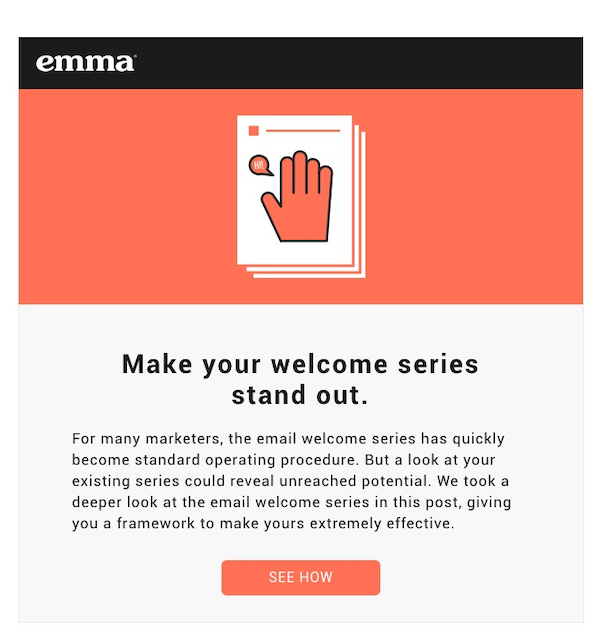
5. Write casual, fun copy.
Write as you talk. Nobody appreciates large, dull, jargon-heavy chunks of texts. Make it easy, fun, and rewarding to read your emails. And, be ultra-clear about what next step you want the reader to take.
Use active, positive language and keep sentences short and concise. And, if appropriate, use humor; people like to smile.
This email copy from Uber is creative, on-brand, and to the point:
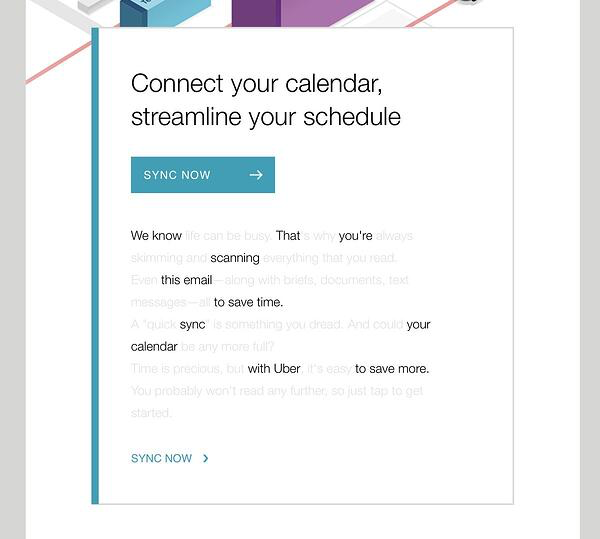
6. Leverage your transactional emails.
After welcome emails, transactional emails have among the highest open rates of all email marketing messages. And yet, they rarely contain more information than that of the actual transaction. That means an opportunity for you.
By giving your transactional emails some extra love and attention, you will wow your customers in a way that many companies miss out on.
7. Conduct A/B testing.
If you’re sending emails, you should be doing A/B testing. You can test every element of your emails, from subject lines and preview tests to copy, images, design, and CTAs.
The more you test, the better you will get to know your target audience. And the better you know your audience, the more you will be able to engage them with your emails.
8. Make sure your email is mobile responsive.
Most people open emails on their mobile device. This means that if your emails aren’t mobile responsive, a large portion of them will be going to waste.
Always make sure that your design has as good or better UX on mobile as on desktop.
9. Personalize your emails for each recipient.
Customers get frustrated with brands that fail to create personalized experiences. This is why tailoring your email marketing to the recipient is crucial.
An email that is not personalized risks doing more harm than good. In one marketing study, 82% of marketing specialists witnessed a substantial increase in opening rates when they leveraged the power of personalization.
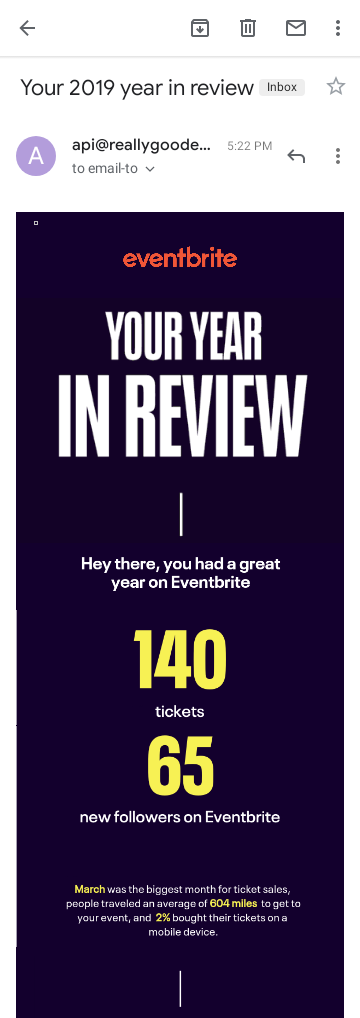
Eventbrite sends these personalized emails with reports on how successful is users’ events have been during the past year. This type of personalized content can also be a great way to encourage social sharing and engagement within a team, multiplying the effect of your emails.
10. Segment your email marketing.
Segmenting your email list enables you to get the right message to the right buyer persona at the right time in their buyer journey. And, that is crucial for increasing conversions.
To send segmented emails that are more likely to convert, first integrate your email and marketing software with your CRM and other sources of customer data.
This gives you a 360-degree view of your contacts everywhere, including your email marketing platform. It’s then easier than ever to send highly personalized emails based on your contacts’ groups, memberships, and other properties.
Better Data Means Better Email Engagement
Email communication is one of the most effective ways that you can reach out to customers and prospects. But keeping your emailing lists up-to-date and personalizing your content can be challenging.
That’s where integration steps in: sync the contact databases across your app stack, so you’re always working with fully enriched, up-to-date, and relevant data.
With your CRM and email tool in sync, you can automatically send recent subscribers and leads to your email tool. You can also sync extra data for better segmentation of your marketing and nurturing campaigns — plus easily personalized outreach in every email.
At the same time, you can merge marketing qualified leads (MQLs) back to your CRM with updated data for sales to work with — all without overwriting existing data.
![]()


